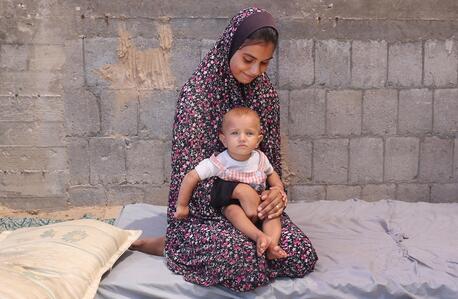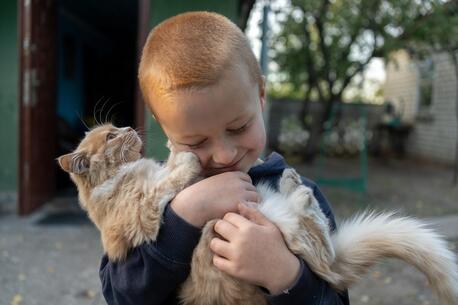
UNICEF Helps Children Heal From the Shock of War in Ukraine
Eleven-year-old Polina was hiding in a basement near the hospital where she was born in Mariupol, Ukraine, when the building was hit by a shell on March 9.
The terrifying memory is still vivid in her mind. “I was in the basement and my mother and grandmother were on the ground floor,” the young girl recalls. “There was such a strong explosion that it deafened me. Everything fell from the ceiling and I started screaming. The other girls were also screaming and crying, and there was one girl who we couldn't calm down at all, even when it was over.”
The hospital where Polina came into the world, the kindergarten where she played and the school where she studied have all now been destroyed. In late March, after weeks underground, she finally fled Mariupol with her mother and grandmother. The family eventually found shelter in Vinnytsia, a city in west-central Ukraine.
They are safer now, but the trauma of Polina's wartime experience lingers. Sleeping alone is out of the question; she won't let her mother out of her sight. "She is afraid to even go into the next room alone," says her mother, Tetiana.
Art therapy helps children traumatized by the war in Ukraine:
In Vinnytsia, Tetiana reached out to UNICEF to help her daughter overcome her fears. Since late April, an interdisciplinary mobile team has been working in the region with the support of UNICEF and the Ukrainian Public Health Foundation. The team provides free psychological, social, medical and legal advice for those in need.
With help from the team, Polina and her mother found a local art class, where children gather to do creative projects, reestablish social ties and recover a sense of normalcy that was stripped away by the conflict.
Making art and being with other children is helping Polina regain her equilibrium. "I love drawing very much," she says.
Her mother is relieved to see that Polina is starting to feel less afraid. "I noticed that, while communicating with other kids and doing something with her hands, she is relaxing. First, she smiles more often," says Tetiana. "Her reaction to the noise from a construction site is no longer that big. She became more liberated."
Since Feb. 24, UNICEF and partners have reached more than 491,000 children and caregivers from Ukraine with mental health and psychosocial support
Children living through war and conflict need urgent mental health care and psychosocial support to help them recover from the trauma they've experienced. UNICEF is working to reach kids impacted by the war in Ukraine with the services they need. Since Feb. 24, UNICEF and partners have reached 491,125 children and caregivers with mental health and psychosocial support and provided case management and referral services to 46,364 children.
Your support for UNICEF's humanitarian response to the war in Ukraine can make a difference. Please donate.
Top photo: An art class is helping 11-year-old Polina recover from the terror she experienced living through the war in Mariupol, Ukraine. UNICEF is working with partners to reach children in need with mental health support and psychosocial services. © UNICEF/UN0632969/Latayko.Video edited by Tong Su for UNICEF USA.
UNICEF-supported art therapy helps children traumatized by the war in Ukraine. [VIDEO]
HOW TO HELP
There are many ways to make a difference
War, famine, poverty, natural disasters — threats to the world's children keep coming. But UNICEF won't stop working to keep children healthy and safe.
UNICEF works in over 190 countries and territories — more places than any other children's organization. UNICEF has the world's largest humanitarian warehouse and, when disaster strikes, can get supplies almost anywhere within 72 hours. Constantly innovating, always advocating for a better world for children, UNICEF works to ensure that every child can grow up healthy, educated, protected and respected.
Would you like to help give all children the opportunity to reach their full potential? There are many ways to get involved.





